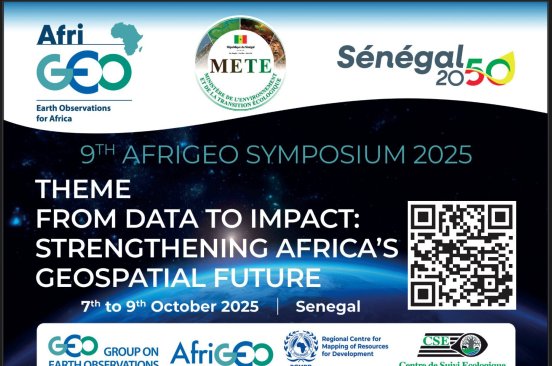
SandagaDrone: Supporting Young Entrepreneurs in Senegal
Our entrepreneurship programs are part of our holistic approach to capacity-building in technical, programmatic, and organizational expertise.
April 16th, 2021
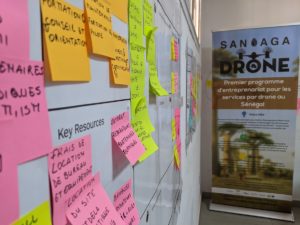 In November 2020, Senegal Flying Labs launched the first version of their entrepreneurship program called SandagaDrone. The program’s goal is to support young entrepreneurs to launch their own “drones as a service” business. While several start-ups and business incubation programs already exist in Senegal, none focuses on using certain technologies, such as drones. From our own experience, we know how important it is to be part of an ecosystem and have the needed enabling environment to create a sustainable venture, to grow and thrive while contributing to the growing ecosystem. Our entrepreneurship programs are not a “free-standing” activity; they are part of our holistic approach to capacity-building in technical, programmatic, and organizational expertise.
In November 2020, Senegal Flying Labs launched the first version of their entrepreneurship program called SandagaDrone. The program’s goal is to support young entrepreneurs to launch their own “drones as a service” business. While several start-ups and business incubation programs already exist in Senegal, none focuses on using certain technologies, such as drones. From our own experience, we know how important it is to be part of an ecosystem and have the needed enabling environment to create a sustainable venture, to grow and thrive while contributing to the growing ecosystem. Our entrepreneurship programs are not a “free-standing” activity; they are part of our holistic approach to capacity-building in technical, programmatic, and organizational expertise.
SandagaDrone has four phases stretched over six months. The program’s first phase—the ideation phase—held from November to January motivated 21 teams made up of 100 passionate innovators to submit their business idea describing how they will use drone technology to develop its “drone as a service” business. Each team pitched their idea during a virtual pitch day in early February. A jury of four local technology and business experts then had the difficult task of choosing the four most promising ideas and teams.
The four selected finalist teams continue their SandagaDrone journey with the goal to turn following ideas into businesses:
- A team proposing to bring much-needed drone repair services to Senegal and the region
- A team focusing on cargo drones for critical medical deliveries
- A team addressing the needs of youth and fitting STEM educations using drones
- A team pursuing an innovative new idea of using drones for window cleaning
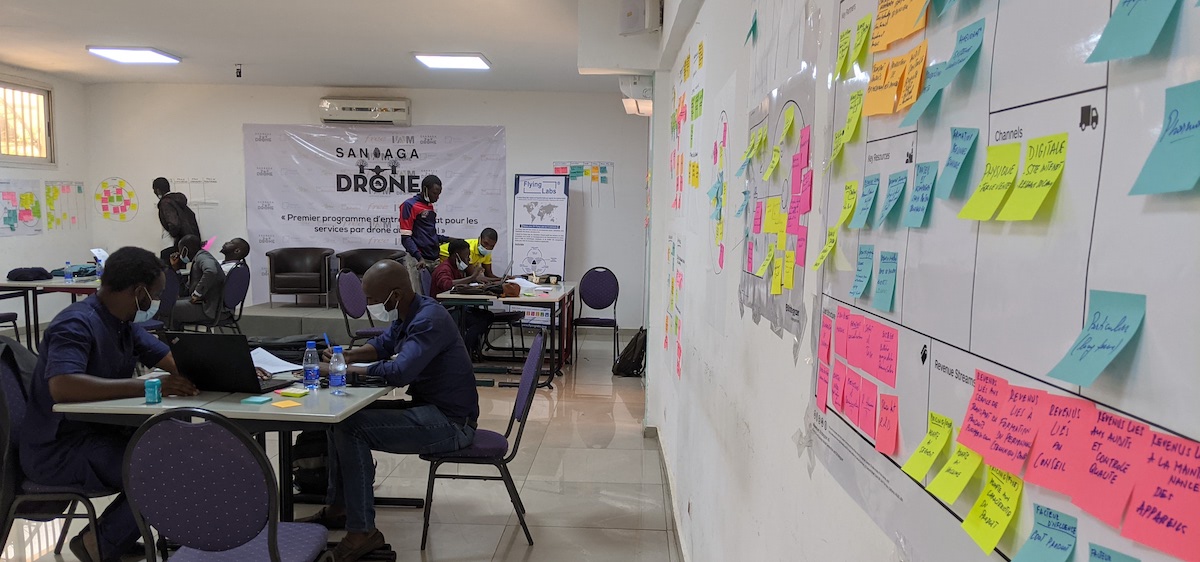
The 12 key actors of these four teams came together from April 7-10 in Dakar for the second phase of the program, the "Strategy" phase. This four-day in-person seminar, co-led by team members of Senegal Flying Labs and WeRobotics’ Co-Founder Sonja Betschart, introduced the teams to a practice-oriented methodology for creating their company’s vision, mission, business model, commercial strategy, and financial plan. The walls of the large seminar room (allowing for social distancing) did not stay empty for long as the teams worked on their strategies as well as business, and financial plans.
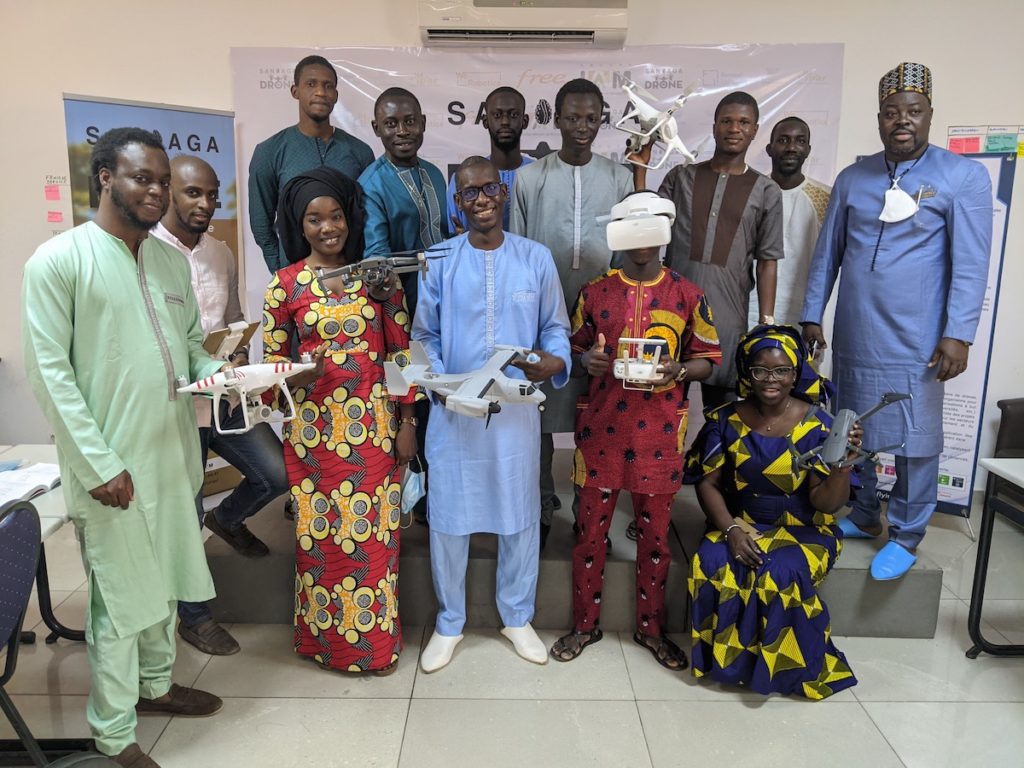 On the last day, the teams presented their work in the format of a first pitch. They shared their needs for mentorship for the next ("Iteration") phase. During this third phase, each team will validate their model with potential partners and clients and finalize their business and financial plans. They will also prepare for the SandagaDrone final pitch competition - to be held on June 2 - during which an expert jury will select the winning team.
On the last day, the teams presented their work in the format of a first pitch. They shared their needs for mentorship for the next ("Iteration") phase. During this third phase, each team will validate their model with potential partners and clients and finalize their business and financial plans. They will also prepare for the SandagaDrone final pitch competition - to be held on June 2 - during which an expert jury will select the winning team.
The 12 entrepreneurs appreciated the methodology and pedagogy used (ten percent theory, ninety percent practical application) and the collegial environment fostered among all the participants. Seeing each other as partners—not competitors—demonstrated the vast opportunities the drone sector offers and the need for a robust local ecosystem to grow the market.
We would like to thank our program partners, the Jansen PrimeSteps Foundation, IAM, Free, and IPAR, for their support, and special gratitude for IAM for graciously hosting the seminar in their school’s inspiring environment and for Jansen PrimeSteps Foundation to sponsor this program.
Category(s)
Recent Articles
View All »
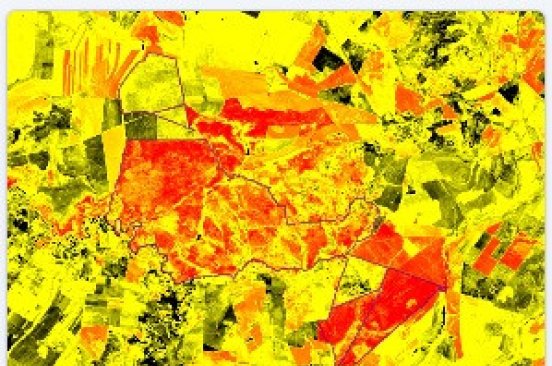
Wildfire Assessment and Web Application in Sao Paulo
